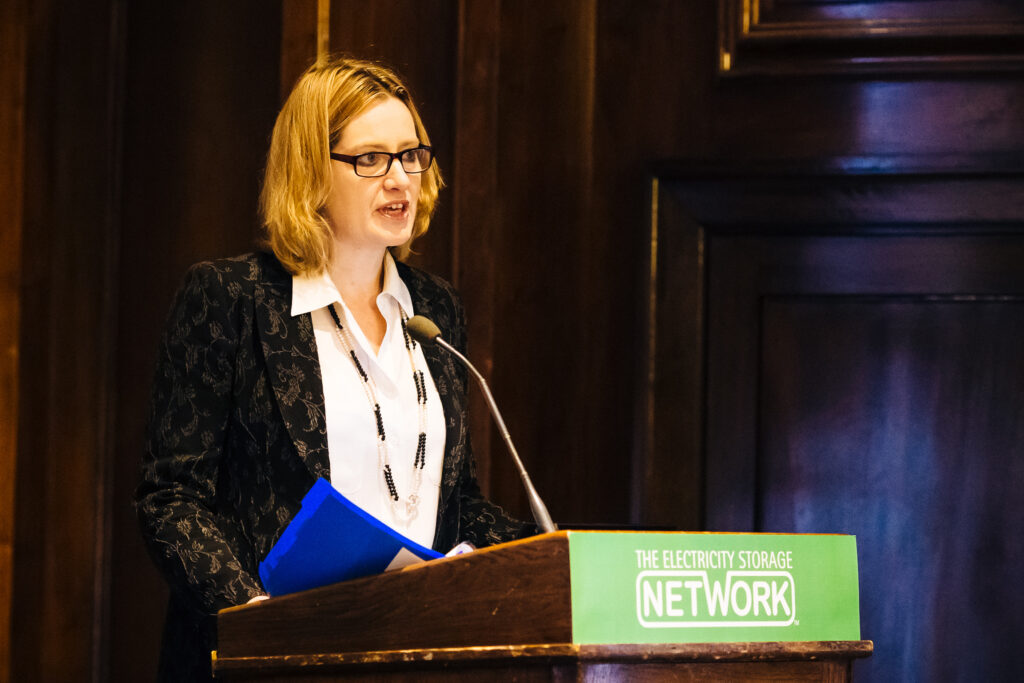The UK’s minister for energy has said that her government is not planning any framework of incentives for energy storage, but said nonetheless that public funds can help “bridge the gap” between ideas and commercialisation.
Amber Rudd, a minister at the Department for Energy and Climate Change (DECC), attended an event hosted in Westminster by the Electricity Storage Network, a UK trade association which has suggested the country needs a target of 2GW of energy storage deployed by 2020.
The UK currently has a few programmes in place to examine the feasibility of energy storage as well as several pilot projects at residential and larger scales. In terms of programmes currently running, a small amount of funding, around £3 million, has been put into research and feasibility studies into early stage technologies. Meanwhile, four different energy storage technologies will compete in an £18 million trial funded by the department.
However, as Ray Noble of the Renewable Energy Association recently pointed out, there is no unifying national policy framework in place to support increased deployment in the UK as yet. This looks unlikely to change drastically in the short term with the country heading for a general election in May this year. Rudd’s chief scientific adviser at DECC, John Loughhead, also said at the event that setting a national a target for energy storage, or for any specific storage technology type could be a less useful mechanism than “targets for the services storage can provide”.
‘Under review’
The minister was asked questions by attendees on topics including the possibility of feed-in tariffs (FiTs) for energy storage, the failure of recent capacity market auctions intended to shore up UK energy security to award a significant number of contracts to storage and the scope for developing a ‘national storage strategy’ in line with similar moves in solar and community energy.
Referring directly to the 6MWh battery inaugurated late last year in Leighton Buzzard by companies including Younicos and S&C Electric, Rudd defended the government’s targeted funding of a handful of projects and research schemes rather than setting up overarching subsidies or mandates as have been introduced in Germany, California or Japan. Rudd said the Leighton Buzzard project was “a very good example where the public purse plays an important role, bridging that venture capital gap in terms of an idea and something commercial and the bit in between is just too expensive for the market to support”.
On most topics Rudd remained resolutely non-committal, replying for the most part with assurances that the topic in question would be “under review”.
Rudd discussed the four current trial schemes at the event. The selected project developers included Moixa Technology, a provider of battery storage and energy management systems mostly for the residential market and RedT, a flow battery system company which is trialling integration of renewables at remote communities on islands off the coast of Scotland.
A trial deployment of Moixa’s residential storage systems have been supported by the UK government in a competitive demonstration scheme. Image: Moixa.
Supporting framework
Simon Daniel, chief executive of Moixa – one of the four competitive demonstration projects – asked Rudd what kind of support storage could see lent to it in the form of FiTs or similar schemes. Rudd replied that it was a question for the future, once trials have been underway for longer and said this topic too was “under review”.
One attendee alluded to the recent failure of the capacity market auctions to foster significant levels of storage deployment before asking what specific incentives might be applied to storage as a flexibility resource for electricity networks. In the wake of the auction, one developer of pumped hydro storage had described the capacity auction as “evidence of a broken market”.
Rudd said it had been decided by her department not to use the capacity market to finance and support storage, since the use of storage for supply-demand balancing is at an early stage. The minister’s reply appeared to contradict words her cabinet colleague, energy and climate change secretary of state Ed Davey, who, prior to the capacity market auction, had touted the potential for storage to benefit from that process.
International picture
Dr Jonathon Radcliffe, a senior research fellow in energy storage at the University of Birmingham, asked Rudd what could be done to ensure the UK did not fall behind competitively to other markets. Radcliffe said it was understandable the government did not want to back a specific technology at this early stage of the market, but said other territories had already gained a head start and could further extend their lead.
Again Rudd said the topic would be “under review”.
Later, Radcliffe told PV Tech Storage that he did have “…a bit of concern that the government targeted energy storage as one of the ‘eight great technologies’ a couple of years ago as an area to support because there’s good capability in the UK to develop the technologies and we can make some money out of it, as well as improve the energy system, essentially from deploying it in the UK”.






